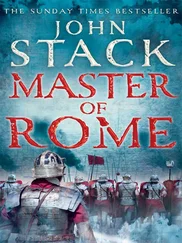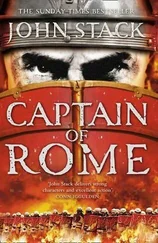‘Advance the line!’ Septimus ordered, finally released to command his men.
The legionaries stepped forward under the familiar command of a centurion, their swords exacting a terrible price from the Carthaginians on the front line. A ripple of panic ran through the Carthaginian formation, a ripple that soon became a wave as Carthaginians turned from the advancing wall of shield and iron, the vacuum created by their retreat hastening the advance of the line. Almost as one they finally broke, their resistance buckling, and they fled the main deck as one. The Romans cheered in triumph as the pressure against their line dissipated.
‘Drusus!’ Septimus called, the optio immediately by his side.
‘Two parties, fore and aft, clear the decks and then sweep below. Wipe out all resistance.’
The optio nodded and left to command the legionaries. Only then did Septimus collapse from his wound.
Hamilcar was staggered by the sight before him. Everywhere he looked Carthaginian galleys were locked in hopeless fights against an enemy that had somehow turned the naval battle into a land war, immediately making a mockery of the generations-old superior seamanship of the Carthaginians. The Punic warriors, so skilled at boarding and shock attacks, were completely outclassed by the efficient butchery of the Roman legionaries, the wall of shields an impenetrable barrier that swept each deck in turn.
Hamilcar’s quinquereme, the Byblos , sailed unopposed around the flank of the battle, her superior size deterring any Roman attack against her hull. The Byblos was surrounded by Carthaginian triremes milling in abject confusion, their initial escape from the dreaded Roman boarding ramp, and the witnessed destruction of their sister ships, compelling them to withhold from re-engaging the enemy. The sight made Hamilcar nauseous, the shame of his countrymen’s timidity and fear coursing through his heart.
Even at a mile’s distance he had seen the Melqart re-engage, her distinctive size distinguishing her from the surrounding vessels. The Carthaginian centre was completely collapsed around her, the quinquereme flagship lost in the maelstrom. It was a sight that sobered Hamilcar, forcing him to rationally examine the situation as a commander. Gisco had failed. The battle was lost. With bitter resignation, Hamilcar realized the decision that needed to be made, the unendurable order that needed to be given if the remainder of the fleet was to survive. With the taste of acrid shame in his throat, he issued the command to withdraw, cursing the admiral who had once again led the sons of Carthage to defeat.
Gisco bellowed with rage as his forces fled past him for the main deck, leaving the admiral standing alone with his personal guard of a dozen soldiers. On the brink of collapse, Gisco had watched in desperation as the Carthaginian war cries gave way to muttered sounds of panic and furtive glances over shoulders as men sought avenues of escape. Gisco had seen Khalil fall, the massive Nubian warrior clearly visible even in the maelstrom of battle. The fall was immediately followed by a shouted Roman command to advance as the centurion once more took charge of his men. The moment of victory had been snatched from Gisco by the re-formation of the Roman line and the Romans’ success in holding the breach. One man had brought about the recovery of the Roman line; one man who Gisco had seen run across the boarding ramp at the very height of the battle.
The Melqart was lost but victory was still in the offing, a victory that now depended on Gisco avoiding capture. He quickly ordered two of his men to launch the skiff and bring it alongside, making ready the flight he now knew was inevitable. Only one task remained before his escape, one vow to fulfil, one man to send through the gates of Hades. The man who had precipitated his defeat, the captain of the Aquila.
Atticus cheered with his men as the Carthaginians fled before the Roman line, the enemy split down the middle as men ran towards the fore and aft of the ship, seeking refuge and escape below decks. As his eyes scanned the chaotic scene before him, Atticus noticed an unmoved knot of men formed at the far rail. There were maybe a dozen in total, their leader standing tall at their head. Atticus recognized him immediately, although it had been months since their first encounter. He was the commander who had chased the Aquila from the Strait of Messina, and Atticus realized in an instant that the commander of the Carthaginian flagship was the admiral of the Punici.
Atticus bellowed a challenge to the Carthaginian, the remaining men of the Aquila immediately forming behind their captain as they saw the reason for his outburst. Gisco had been scanning the deck himself and the shouted defiance focused his attention on the man he sought amidst the chaos.
‘You!’ Gisco roared.
For a heartbeat the two men locked eyes across the blood-soaked deck, their mutual belligerence forming an inescapable bond. Gisco’s mind swam with visions of defeat at Agrigentum, of humiliation in the Strait of Messina and the doomed fleet surrounding him. Atticus saw only the massacre at Brolium, the defeat at Lipara and the vow he had made to a centurion many weeks before.
With a visceral cry both men charged across the deck, their crews following recklessly behind. The two forces met in the centre, the groups overlapping into a mêlée of tangled, individual contests. The fight was vicious, the men of the Aquila outnumbering the Carthaginians, and within seconds the balance of the struggle was set.
Atticus and Gisco fought in the middle of the fray, their fury turning the fight into an uncoordinated brawl, both men using their swords like clubs in the frenzy of attack. Within seconds the contest became one of brute physicality, anger and hate suppressing all skill. Gisco’s strength, forged by thirty years of combat, pitted against the speed of a younger man.
Atticus was first to regain his wits, and he focused his mind to channel his aggression. Gisco’s attack filled his vision, the endless blows numbing his sword arm, and Atticus sidestepped suddenly to gain a heartbeat’s respite. His speed fooled Gisco, the admiral immediately trying to re-engage, but Atticus sidestepped once more to keep the Carthaginian off balance.
Gisco roared in frustration as the Roman captain continued to elude his sword, the younger man’s superior speed now dictating the focus of combat. Gisco realized that within a dozen strikes the contest would be lost, its end inevitable. The adrenaline and blood lust in his system rapidly cooled as his body sensed the failing strength of his arm and he stepped back for the first time, his eyes seeing a look of triumph cross the Roman’s face. With a final ferocious roar Gisco summoned up all his rage, all the hate within his soul for the enemy he could never overcome, and he grabbed the man to his left and hurled him at the Roman captain.
Atticus reacted instinctively to the sudden attack, the oncoming Carthaginian completely off balance from the unexpected push. Atticus drove his sword forward, putting his shoulder behind the thrust and, although the Carthaginian guardsman reacted instinctively, he could not avoid the outstretched blade, the gladius striking him full in the chest, the momentum of his charge and the force of the strike burying the blade deeply. Atticus was shoved off his feet as the full weight of the guardsman hit him, the Carthaginian dead before both men struck the deck. Atticus kicked wildly to free himself, twisting his blade to release it from the clinging flesh, the rush of blood warm over his hand. He pushed the Carthaginian to the side and clambered up, immediately regaining his balance and adopting a defensive stance in the midst of the dying fight around him. His eyes sought out the Carthaginian admiral, expecting to see him directly in front. It took a full second before Atticus realized his enemy had fled.
Читать дальше
Конец ознакомительного отрывка
Купить книгу











